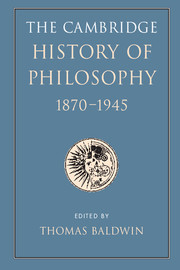Book contents
- Frontmatter
- Contents
- List of contributors
- Introduction
- I 1870–1914
- II 1914–1945
- 8 Logic and philosophy: the analytic programme
- 9 The diversity of philosophy
- 10 Knowledge, language, and the end of metaphysics
- 11 Philosophy and the exact sciences
- 12 Mind and its place in nature
- 51 Vitalism and emergence
- 52 Behaviourism and psychology
- 53 Gestalt psychology
- 54 Wittgenstein’s conception of mind
- 13 Philosophy and social science
- 14 Ethics, religion, and the arts
- 15 Law and politics
- Biobibliographical appendix
- Bibliography
- INDEX
- References
54 - Wittgenstein’s conception of mind
from 12 - Mind and its place in nature
Published online by Cambridge University Press: 28 March 2008
- Frontmatter
- Contents
- List of contributors
- Introduction
- I 1870–1914
- II 1914–1945
- 8 Logic and philosophy: the analytic programme
- 9 The diversity of philosophy
- 10 Knowledge, language, and the end of metaphysics
- 11 Philosophy and the exact sciences
- 12 Mind and its place in nature
- 51 Vitalism and emergence
- 52 Behaviourism and psychology
- 53 Gestalt psychology
- 54 Wittgenstein’s conception of mind
- 13 Philosophy and social science
- 14 Ethics, religion, and the arts
- 15 Law and politics
- Biobibliographical appendix
- Bibliography
- INDEX
- References
Summary
INTRODUCTION
In looking at Wittgenstein’s philosophy of mind up to 1945 we are attempting to survey a period that covers virtually the whole of Wittgenstein’s philosophical development, from the Notebooks, 1914–1916 to the end of Part 1 of the Philosophical Investigations. One of the central interpretative questions raised by the large body of work that is produced in this period is whether we should see it as the more or less continuous development of a reasonably unified philosophical vision, or view it as containing one or more important discontinuities or radical breaks. It is a question on which interpreters of Wittgenstein fundamentally disagree. There can be no question of doing justice to this dispute in this brief introduction to Wittgenstein’s thought. I shall therefore limit myself to attempting to develop one clear line of interpretation, in which I side with those who see Wittgenstein’s later philosophy as a development, rather than a rejection, of his early work.
From the very beginning, Wittgenstein characterises philosophy as a ‘critique of language’ (1921 [1922] Tractatus Logico-Philosophicus (TLP) 4.0031) and associates philosophical problems with ‘our failure to understand the logic of our language’ (TLP: 4.003). We should, therefore, expect his view of the mind to be grounded in his conception of language and how it functions. Similarly, we should expect any development in his view of the mind to be traceable ultimately to developments in his view of language and of how the task of achieving a clarified understanding of it is to be accomplished. Equally, the suggestion that we can trace a continuous development in Wittgenstein’s philosophy of mind from the early to the later work commits us to the claim that there is an important, underlying continuity between his early and his late philosophy of language.
- Type
- Chapter
- Information
- The Cambridge History of Philosophy 1870–1945 , pp. 658 - 666Publisher: Cambridge University PressPrint publication year: 2003



